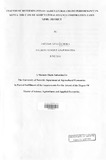| dc.contributor.author | Echoka, JO | |
| dc.date.accessioned | 2013-05-22T12:28:07Z | |
| dc.date.available | 2013-05-22T12:28:07Z | |
| dc.date.issued | 2010-06 | |
| dc.identifier.citation | Master of Science, Agricultural and Applied Economics, University of Nairobi, 2010 | en |
| dc.identifier.uri | http://erepository.uonbi.ac.ke:8080/xmlui/handle/123456789/24456 | |
| dc.description.abstract | The main research objective was to analyze the determinants of agricultural credit
performance in Agricultural Finance Corporation (AFC) Kenya. The specific objectives were to
analyze the historical and current performance of AFC and test the null hypotheses that; costs of
lending, institutional organization and group lending have no influence on delinquency of
agricultural credit in AFC Uasin Gishu District of Kenya.
The problem stems from poor performance of agricultural credit in AFC perceived
through a declining: growth trend in portfolio and client base; Profit before Tax (PBT); and
persistent high loan delinquencies.
The method used is an empirical analysis of AFC corporate performance records and a
truncated regression of secondary data from AFC loans in Uasin Gishu District. Maximum
Likelihood Estimates (MLE) tobit model was utilized because the dependent variable
delinquency rate is non negative and limited such that we observe y*/y*>O. MLE option adjusts
the estimates of the coefficients to take into account the effect of truncating the sample at zero.
The study established that agricultural credit delivered through AFC faces both external
and internal challenges. External challenges relate to policy environment, climate, market and
socio-economic related risks. The internal challenges are those associated with interest rates
charged, operational prudency and poor lending practices. The tests of significance led to
rejection of the null hypotheses and conclusion that cost(s) of lending, institutional arrangements
and group lending activities have an influence on the delinquency rate therefore performance of
agricultural credit by AFC in Uasin Gishu district of Kenya.
This implies that there is need for policy intervention necessary to transform AFC
business model to adopt the new development paradigms i.e. value chain financing where an
effective agricultural credit system has to recognize the whole spectrum of agricultural value chain
players and implement prudential standard guidelines of the Association of African
Development Finance Institutions (AADFI). The legal mandate governing AFC needs to be
reviewed to redefine roles and empower AFC to increase agricultural lending by: identifying and
analyzing successful lending: partnering with other agricultural lenders; and assisting central
bank in monitoring of agricultural lending.
The study was limited in its achievements to the context of agro-economic frameworks
but global concerns go beyond this and are interested in the interaction with social-ecological
systems (SESs) .To Bridge the gap between panacea and development of strong interdisciplinary
SESs this study recommends further institutional research beyond the agricultural economic
aspect of activities of agricultural lending. This is with the aim of development of frameworks
that's will enable organization of resource systems, the resource units generated by the systems,
the users of those systems, and the governance of the systems to effect positive interactions in
the resulting outcomes achieved at particular times and places. | en |
| dc.language.iso | en | en |
| dc.publisher | University of Nairobi. | en |
| dc.title | Analysis Of Determinants Of Agricultural Credit Performance In Kenya: The Case Of Agricultural Finance Corporation, Uasin Gishu District | en |
| dc.type | Thesis | en |
| local.publisher | Department of Agricultural Economics | en |

